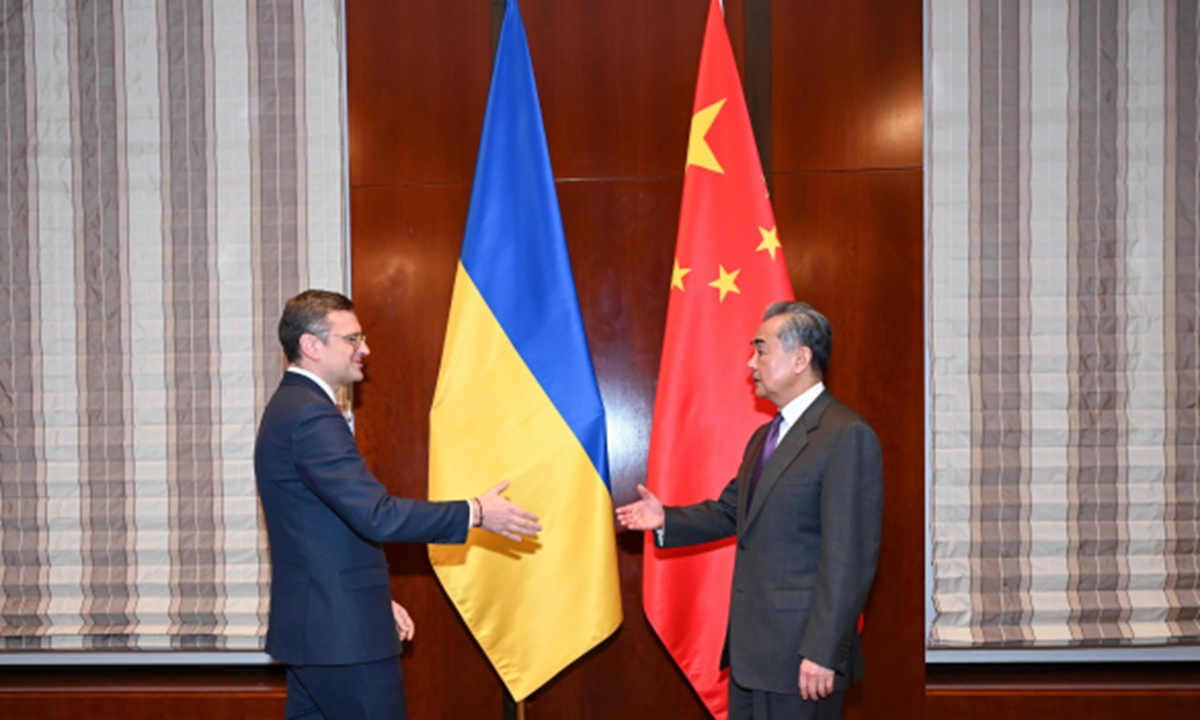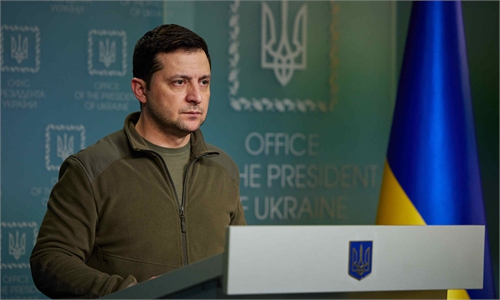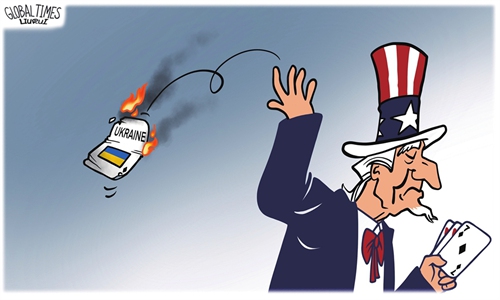
Chinese Foreign Minister Wang Yi, also a member of the Political Bureau of the Communist Party of China Central Committee, meets with Ukrainian Foreign Minister Dmytro Kuleba on February 17, 2024 on sidelines of the Munich Security Conference. Photo: Website of Chinese Foreign Ministry
As the Russia-Ukraine conflict, breaking out two years ago, has caused casualties and resulted in serious damages to both sides up to today, Chinese Foreign Minister Wang Yi reiterated at the Munich Security Conference (MSC) that China has stayed committed to promoting peace talks on the Ukraine issue and will not give up as long as there is a glimmer of hope.
Wang, also a member of the Political Bureau of the Communist Party of China Central Committee, made the remarks on Saturday during a meeting with Ukrainian Foreign Minister Dmytro Kuleba on the sidelines of the MSC.
China insists on resolving hot spot issues through political means and keeps promoting peace talks, refrains from adding fuel to the fire or taking advantage of the situation, and refrains from selling lethal weapons to conflict areas or parties, Wang said.
Wang also reiterated China's stance when answering questions about the Ukraine crisis following his keynote speech during the "China in the World" session at the MSC on Saturday.
Chinese analysts said on Sunday that over the past two years, China has always played a neutral and responsible role without bias and prejudice to help the conflicting parties to seek common ground and avoid escalation, which is totally different from the US-led West's adding fuel to the flames.
On the battlefield, Russia on Saturday realized full control of Avdiivka after months of grinding battles in the stronghold that had been held by Ukraine. This gives Moscow the advantage to decide whether to attack other regions or just defend the territories under its control, according to observers.
Many Western analysts are also aware of the changes and are increasingly doubtful about the necessity and effectiveness of expensive military aid to Ukraine, some attendees to the MSC told the Global Times.
To promote peace talks
At the MSC, when asked about China's views on the Budapest Memorandum and China's position on the Russia-Ukraine conflict, Wang said China is not a signatory to the Budapest Memorandum, but has recognized it through a government statement.
China did not create the Ukraine crisis, nor is it a party to the crisis, yet China neither stood idle nor took advantage of the crisis. "Chinese President Xi Jinping said that the sovereignty and territorial integrity of all countries should be respected, the purposes and principles of the UN Charter should be abided by, the legitimate security concerns of all countries should be taken seriously, and all efforts conducive to a peaceful settlement of the crisis should be supported. This is China's official position and fundamental principle on the Ukraine issue," Wang stressed.
China has stayed committed to promoting peace talks and played a positive role in efforts to restore peace. The earlier the peace talks resume, the less damage for all sides, said Wang.
MSC attendee Cui Hongjian, a professor with the Academy of Regional and Global Governance at Beijing Foreign Studies University, told the Global Times on Sunday that Western countries have always had unrealistic expectations and demands of China over the Ukraine crisis. For instance, they want China to stand with them to sanction Russia. To urge China to do so, they downplay China's constructive role in facilitating dialogue.
"Some Western attendees always complain that the role that China has played is not enough and they hope that China can reduce its trade with Russia," Cui said.
Such views are unhelpful to the solution of the crisis, and if China sides with the West, it would have a huge negative impact on the global strategic balance and stability, experts said.
China is the only permanent member of the UN Security Council that can still have communication with and is being listened to by both Moscow and Kiev, and such a role is extremely important for mediation, experts noted.
Some Western attendees, such as NATO Secretary General Jens Stoltenberg, hype the narrative that "China and Russia are forming an alliance to challenge the West" and they have tried to link the Ukraine crisis with the Taiwan question, "out of the hegemonic interest of the US," Cui said, "But fortunately, they are not the mainstream," Cui concluded on the basis of his conversations with European attendees at the MSC.
Change in battlefield
Russian Defense Minister Sergey Shoigu has informed President Vladimir Putin that the town of Avdiivka near Donetsk has been taken under full control, TASS reported on Saturday.
The New York Times (NYT) reported on Saturday that Ukraine ordered the complete withdrawal from the decimated city of Avdiivka before dawn on Saturday, "surrendering a position that had been a military stronghold for the better part of a decade, in the face of withering Russian assault."
The NYT report also said some Ukrainian military personnel expressed concern privately in interviews that the call to withdraw had come too late, or posted on social media of their dangerous and chaotic retreats.
Wei Dongxu, a Beijing-based military expert and media commentator, told the Global Times on Sunday that "the battle of Avdiivka showed that Ukraine does not have enough troops and firepower to defend the stronghold, while Russia has enough resources to launch attacks from different directions."
As Russia is trying to expand its advantage step by step, Ukraine is being confronted with more and more difficult fights, said experts.
Cui Heng, a scholar from the Shanghai-based China National Institute for SCO International Exchange and Judicial Cooperation, told the Global Times on Sunday that the victory in Avdiivka will help Putin to secure a victory in the upcoming election. "With the town in its hands, Russia is poised to continue attacks, change to defensive posture, or even unilaterally declare the end of its special military operation." Cui Heng said.
But experts noted that no matter what happens in the battlefield, China's stance of promoting dialogue and creating conditions for peace talks will not change. But to what extent peace talks can take place also depends on how many further interruptions the US-led West may make, they said.



